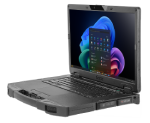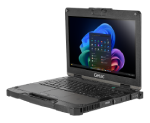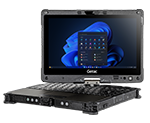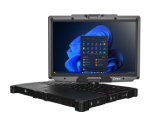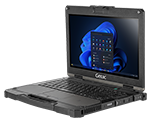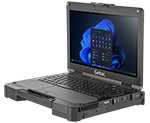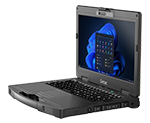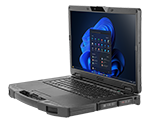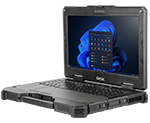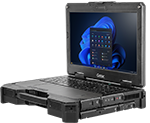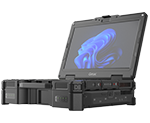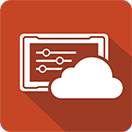Rugged Computer Shields IED Blast

Military investment in rugged technology is usually targeted at protecting equipment from harsh conditions and extreme environments.

But a recent incident in Afghanistan has seen the Dutch Army witness first-hand the benefits of rugged protection.
During a routine patrol an army unit was exposed to an IED attack just several metres from an off-road vehicle. The IED explosion shot a rock though the vehicle window and hit the team’s Getac rugged laptop, cracking its case and leaving about a five-centimetre puncture.

The notebook, which was on the vehicle dashboard at the time, bore the brunt of the force and saved the solider inside from serious injury – and the computer remained operational.
Getac UK Sales and Marketing Director Peter Molyneux said rugged mobile computer equipment is essential for troops stationed in Afghanistan, and they’ve worked to deliver to the exact requirements of the Dutch Army. Its personnel need to be able to quickly and easily communicate with each other to gather information on danger zones and battlefield strategies.
“Tactical air control parties work in the frontline and conduct targeting for close air support, often using rugged communications equipment outside the safety of a vehicle,” Mr Molyneux said. “The software that forces use must be able to run properly in brutal environments, and proper data transmission is vital.”
In this instance, the unit was mounted on the off-road vehicle's dashboard. The magnesium alloy casing that surrounds all Getac notebooks and the shock-mounted hard drive inside ensured that the unit survived the shrapnel blast and remained fully functional.
“While the IED incident may be an extreme example, it demonstrates the strength of the equipment in a true-to-life situation,” Mr Molyneux said.
“Increasing demands are being placed on troop equipment and we’re proud to be working with army personnel to provide customised rugged computing solutions that meet the needs of the environments they operate in.”
This is important, as many military vehicles were not originally built with notebooks in mind and many are retrofitted with mounts that do not always protect the computers in the optimal way, Mr Molyneux said.
“It shows the importance of investing in cutting edge ruggedised equipment. Getac notebooks are built to work under extreme temperatures, and in the case of Afghanistan, this can also mean temperature fluctuations from the severe desert heat to below -10°C, which our units can handle.
“Another key concern for equipment operating within the desert environment is dust. Getac’s rugged computers are IP65 sealed against dust and water. For further field durability the unit was specified with glove-use touch pad and rubberised, full-sized keyboard, with backlight key legends for night use. And the notebooks' unique fan-free design and sealed caps and doors further protect crucial data from becoming victim to the elements.”
The Dutch technical air control received the first batch of Getac rugged computers, and based on positive reviews from that initial order, more were purchased for several other troops. The units are now used in both Afghanistan and the Netherlands.
Although the Dutch troops do not use Getac notebooks as their main satellite GPS tool because of military regulations, they have discovered they can use them as a secondary GPS.
“We’ve had army feedback saying they’ve found the Getac GPS system is very quick to respond and offers a truly viable option to the primary GPS,” Mr Molyneux said.
Getac works extensively with the Dutch army units to ensure they receive the best possible service and support, including through an industry-leading, five year warranty.
“Frontline forces need to know they can rely on their kit – and as the Dutch army has discovered they can rely on Getac,” Mr Molyneux concluded.
